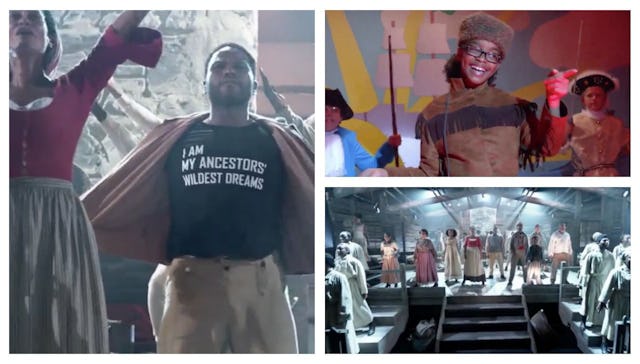Today Is Juneteenth. What does that mean? 'Black-ish' Helps Explain

If are a Black-ish fan, you likely saw last season’s episode that was dedicated to the solely African-American holiday of Juneteenth. If you’ve never heard of Juneteenth, you’re not alone.
Juneteenth is a holiday few people have heard of, but everyone needs to know about. And what better show than Black-ish — known for its ability to tackle relevant and important topics like race, policy, and Trump in an edgy, hilarious, and relatable way — to give us a little history lesson during a midweek sitcom.
In the show’s Season 4 premiere, the twins’ school is putting on a play about Christopher Columbus, but their dad Dre is having none of the white-washed nonsense and misinformation about colonialism we’ve all been spoon-fed. Why aren’t we learning about Juneteenth? — Dre wants to know.
In a Hamilton-style musical rendition, the cast of Black-ish schools us all a bit in this very important holiday. If you haven’t seen the episode yet, you can watch the performance of the song “We Built This,” which explains how the monuments of this country were built on the backs of slaves. Go ahead. I’ll wait.
In other words, despite Abraham Lincoln’s Emancipation Proclamation in 1863 and the 13th Amendment’s official abolishment of slavery in 1865, slavery just wouldn’t die, especially in the South. It wasn’t really over until Major General Gordon Granger arrived in Galveston, Texas, with the news that the war was over and that the slaves in Texas were free on June 19, 1865 — two and a half years after slavery had actually ended.
TWO AND A HALF YEARS.
Juneteeth marks this date — the truest end to slavery in the United States as it was known at the time. Which begs the question: Why is America is so quick to celebrate Columbus — a truly awful person — but barely acknowledges the day all Americans technically became free?
“We don’t celebrate the end of slavery, but you wake us up early on Cyber Monday? You are a bad black person,” Junior said in the episode, scolding his father.
And he has a point. I didn’t really know about Juneteenth until a few years ago, and even in the black community, not everyone has been educated on it (largely because of the whitewashing of historical texts and school curricula).
When Dre tells his white colleagues there’s no holiday to celebrate the end of slavery, they are hesitant to even acknowledge Juneteenth as something worth celebrating. “You’ve got MLK Day. You’ve got Black History Month,” pointed out one of Dre’s co-workers.
Well, sure, but considering slavery lasted for hundreds of years, 29 days out of a year seems… I don’t know… small in comparison. In the episode, Rainbow cuts right to the chase: “Talking about slavery makes white people uncomfortable. And you know white people don’t like being uncomfortable.”
Cue the animated sequence about Juneteenth featuring The Roots set to the tune of “I’m Just a Bill” from Schoolhouse Rock.
And this is why Black-ish is so great — it serves up really important, but sometimes difficult topics in a way that that won’t make white people uncomfortable so that we can get down to business and make things better.
Juneteenth is basically black people’s 4th of July. We celebrate every other independence day, and as Dre pointed out in Tuesday’s episode, “You don’t tell white people or Jewish people that they only deserve one holiday.”
Even though Dre would like to see Juneteenth acknowledged and celebrated as a national holiday, personally, I think it’s important for black people to have a holiday that is ours. White people have co-opted Martin Luther King Jr. Day and turned it into a capitalist nightmare. Black History Month is just an excuse to make tired commercials celebrating the achievements of the same 10 black people we’ve been celebrating since our grandparents were in school.
At the very least, though, people should be willing to acknowledge and educate themselves about it. Knowledge is power, after all.
Next year, I’m going to crack open a strawberry soda (my favorite kind of soda) and bake some red velvet cupcakes (two common forms of celebration) for me and my family. Then we will take time to reflect on how much history has — and hasn’t — changed since that oh-so-important day of June 19, 1865.
This article was originally published on